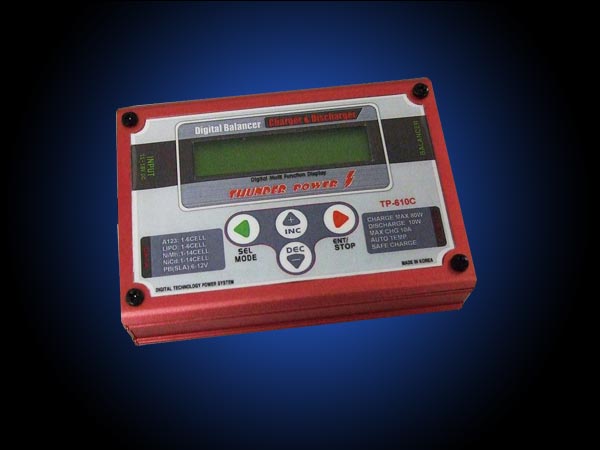Battery Charger: Difference between revisions
No edit summary |
m (4 revisions: Import Equipment category) |
||
| (2 intermediate revisions by one other user not shown) | |||
| Line 1: | Line 1: | ||
Hacklab has a multi-chemistry battery charger on loan from Dan Fraser. | Hacklab has a multi-chemistry battery charger on loan from Dan Fraser. | ||
[[Image:Lg2-610c.jpeg]] | |||
It is a Thunder Power TP-610C charger. There are several parts to the system: | It is a Thunder Power TP-610C charger. There are several parts to the system: | ||
| Line 13: | Line 15: | ||
* Lithium Ion (LiIon) | * Lithium Ion (LiIon) | ||
* Lithium Polymer (LiPo) | * Lithium Polymer (LiPo) | ||
* Lithium Iron Phosphate ( | * Lithium Iron Phosphate (A123) | ||
* Nickel Cadmium (NiCd) | * Nickel Cadmium (NiCd) | ||
* Nickel Metal Hydride (NiMH) | * Nickel Metal Hydride (NiMH) | ||
Latest revision as of 15:14, 19 June 2014
Hacklab has a multi-chemistry battery charger on loan from Dan Fraser.
It is a Thunder Power TP-610C charger. There are several parts to the system:
- Charger
- Balance board
- Banana plug to alligator clip charge cable
Feel free to make your own custom banana plug charge leads for whatever type of battery you need to charge.
This charger is capable of charging almost every type of battery, including:
- Lithium Ion (LiIon)
- Lithium Polymer (LiPo)
- Lithium Iron Phosphate (A123)
- Nickel Cadmium (NiCd)
- Nickel Metal Hydride (NiMH)
- Lead Acid (Pb)
As with any flexible tool, you have to learn to use it properly. The manual is here:
PLEASE READ THE MANUAL BEFORE USE
http://thunderpowerrc.com/PDF/610C0-User-Manual.pdf
There is also a good introduction to this charger and multi-format chargers in general, with much better english:
http://www.helifreak.com/showthread.php?t=68927
The charger works well with the large, heavy 12V regulated power supply that lives on the window sill.
Here are some safety tips for using this charger:
- Double-check all settings before starting a charge
- Never leave charging batteries unattended
- When charging lithium batteries make sure you have selected the proper charge rate and voltage, and monitor the battery for any heat or "puffing" during the charge. Be prepared to stop the charge if anything seems to be going wrong!
